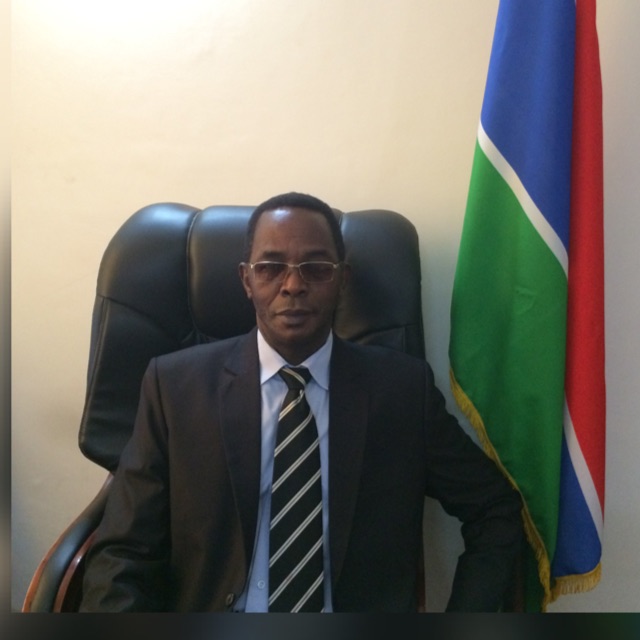Banjul–Beijing Ties Reinvigorated as Gambian Ambassador Presents Credentials to Xi
chinagate.cn by Mariatou Ngum, September 21, 2016 Adjust font size:
On Wednesday September 14 in Beijing, The Islamic Republic of The Gambia’s Ambassador to the People’s Republic of China—His Excellency Dembo M. Badjie—presented his letter of credence to President Xi Jinping at the Great Hall of the People.
Speaking to Gambian journalists, Ambassador Badjie emphasized that Gambia believes in the principles of justice, mutual respect for the sovereignty of other states, non-interference in the internal affairs of other states, genuine partnership for development, and in peace and security around the world.
Badjie disclosed that, on the basis of these points, President Xi expressed delight for resuming diplomatic ties with The Gambia.
He added that the Chinese president extended not only his best wishes to the Gambian leader—His Excellency Sheikh Professor Alhaji Dr. Yahya A.J.J. Jammeh Babili Mansa—but also his personal invitation to Jammeh to come China to further deepen their diplomatic ties.
According to the Gambian ambassador, President Xi has promised his government’s full cooperation to work toward the advancement of the two countries and has stated that China is ready to contribute to and support the development of The Gambia.
Ambassador Badjie further told reporters that the resumption of diplomatic relations between The Gambia and China gives them an opportunity to work toward the renewal of the bonds of friendship and cordial relationship that existed between the two nations since 1974.
He went on to describe China as an important player in global affairs: “We recognize China’s significant contribution to sustainable development in Africa. Your country has demonstrated that it is not only the world’s most successful economy but the world’s greatest development partner to Africa.”
Badjie indicated that the Gambia government, under the exemplary leadership of President Jammeh, supports China’s efforts and commitment to maintain peace and stability in the South China Sea.
“It is hoped that all efforts will be aimed at resolving the differences and dispute in this issue through genuine dialogue. The Gambia stands ready to support China in her international aspirations, including at the level of the United Nations and other forums,” he revealed.
The Gambia, he went on, under the visionary leadership of President Jammeh has witnessed remarkable developmental strides, which have ushered in a new era of hope and prosperity for the country and its people.
As part of this new era, sustainable development and food security have become a focal point and priority for the Gambian administration.
He also mentioned that the Program for Accelerated Growth and Employment—a key strategy of the developmental agenda of the Gambian government—is being pursued relentlessly. “We therefore look forward to the support of friendly countries in this endeavor,” he said.
Finally, Ambassador Badjie expressed his hope that the two countries’ renewed friendship and diplomatic ties can help transform the dreams, hopes, and desires of the Gambian people into reality and can help usher in a new era of China–Gambia rejuvenation based on a foundation of mutual understanding, trust, and confidence to forge ahead in partnership and cooperation to the mutual benefit of the two countries and their people.
About Ambassador Badjie

Ambassador Badjie is currently the dean of The Gambia’s diplomatic service and a long-serving public servant who worked nationally as Permanent Secretary for 10 years and as Commissioner to several of Gambia’s administrative divisions, including North Bank, Lower River, and West Coast.
Badjie also had a long-standing career on the diplomatic front in the old and new republics, with postings in Belgium, as well as six years each in both Sierra Leone and India.
Gambia, China resume diplomatic ties
In March of this year, Neneh MacDouall-Gaye—Minister of Foreign Affairs of the Islamic Republic of The Gambia—together with her Chinese counterpart Wang Yi signed a joint communiqué establishing diplomatic ties between the two countries.
Prior to the signing ceremony, held in Beijing, the two foreign ministers and members of their respective delegations held bilateral talks on issues of mutual interest. The meeting, which lasted over an hour, was centered on key areas of cooperation, including agriculture, fishing, trade and investment, infrastructural development, health, education, aviation and transport, tourism and cultural exchange, and other specific projects.
The two foreign ministers took the opportunity to recognize and commend the leaders of the two countries—President Yahya Jammeh and President Xi Jinping—for their political will, exemplary initiative, and key decision to reestablish diplomatic relations.
The two foreign ministers also held a joint press conference, after which Foreign Minister MacDouall-Gaye and her delegation were treated to an official banquet by her Chinese counterpart.
As part of her engagements, MacDouall-Gaye was also received by Chinese Vice President Li Yuanchao. During their meeting, they both reiterated their respective governments’ desire to work closely together to strengthen and refine their bilateral relations at all levels for mutual benefit as envisioned by the two countries’ leaders.